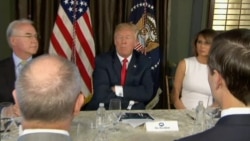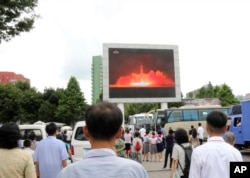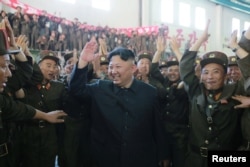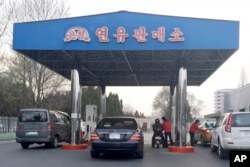Elected officials in Guam are reassuring constituents that the U.S. territory is safe following North Korea's claim that it is examining its plan for “making an enveloping fire” around the strategically important Pacific island.
In the statement issued early Wednesday in Asia, the North's Korean Central News Agency said its armed forces were “carefully examining” a plan for missile strikes on Guam. American military bases on the U.S. Pacific island territory are believed to hold the largest U.S. arsenal of nuclear weapons outside the continental United States.
A spokesman for North Korea's army was quoted as saying the strike plan will be “put into practice in a multi-current and consecutive way any moment,” once an order is given by Kim Jong Un.
Guam Governor Eddie Calvo said there was no threat to the island, but also said it was “prepared for any eventuality” in a televised speech.
Governor Calvo said “Guam is American soil ... not just a military installation,” and was assured by the White House that an attack on Guam would be considered an attack on the United States.
Madeleine Bordallo, Guam's elected congressional delegate, also expressed confidence in the ability of U.S. forces to protect the island amid North Korea's "deeply troubling" threat, but urged Trump to work with the international community to de-escalate tensions.
The moves followed a day of heated rhetoric between Washington and Pyongyang. U.S. President Donald Trump on Tuesday issued a stark warning to North Korea, saying if Pyongyang continues its threats against the United States, "they will be met with fire and fury like the world has never seen."
Trump told reporters North Korean leader's Kim Jong Un had been acting in a "very threatening" manner since the U.S. increased its sanctions against the reclusive communist state and won a unanimous vote by the U.N. Security Council to impose penalties on Pyongyang.
Speaking at his golf club in New Jersey, where he has been on a working vacation, Trump repeated his warning that Kim risked bringing down on his impoverished country "fire, fury and, frankly, power the likes of which the world has never seen before."
DIA conclusion
Earlier Tuesday, U.S. media outlets reported the U.S. Defense Intelligence Agency had concluded that North Korea recently succeeded in building a miniaturized nuclear warhead, small enough to fit in the intercontinental ballistic missiles Pyongyang recently has test-fired.
North Korea issued a statement threatening to attack U.S. bases on Guam a few hours after Trump spoke, but analysts said it appeared to have been prepared before Trump's “fire and fury” warning.
In the statement issued early Wednesday in Asia, the North's Korean Central News Agency said its armed forces were “carefully examining” a plan for missile strikes on Guam. American military bases on the U.S. Pacific island territory are believed to hold the largest U.S. arsenal of nuclear weapons outside the continental United States.
A spokesman for North Korea's army was quoted as saying the strike plan will be “put into practice in a multi-current and consecutive way any moment,” once an order is given by Kim Jong Un.
WATCH: Trump Says Pyongyang 'Best Not Make Any More Threats'
The North has threatened nuclear war with the United States in the past in response to U.N. sanctions over its nuclear tests.
Trump's forceful language Tuesday, and Pyongyang's vociferous response, revived concerns about renewed war on the Korean Peninsula, where three years of combat in the early 1950s ended in stalemate.
"What the last 60 years, since the Korean War ended in an armistice, has shown is that a war of words does not translate into real war," said Balbina Hwang, a Georgetown University adjunct assistant professor. "The increase in rhetoric does raise existing tensions, but it does not translate into a shift of U.S. policy or strategy on North Korea."
Jon Wolfsthal, who was a National Security Council official in former President Barack Obama's administration, warned in a tweet late Tuesday: "We are closer to nuclear use now than at any time since the Cuban missile crisis. We need the president to stabilize, not disrupt."
"I think a number of observers' fear on this issue, and on a number of issues in this administration, is that perhaps there wasn't a careful consideration of the words of our commander in chief in this instance," said David Pressman, a former deputy U.S. ambassador to the United Nations. "If ever there was a topic on which we need to be extremely precise, it's nuclear proliferation, when dealing with someone who is as unpredictable as Kim Jong Un."
It is not known whether North Korea has tested a smaller nuclear warhead, although it said last year that it had. After one successful long-range missile test in July, state media declared North Korea as a "proud nuclear state" with an ICBM "that can now target anywhere in the world."
Media reports on Tuesday that referenced the DIA report said U.S. analysts had concluded that Pyongyang has amassed 60 nuclear weapons, although some experts think the number is smaller, perhaps only half as many.
"The U.S. government has not been able to have reliable, confirmable, accurate intelligence about North Korean military assets for decades, so it's all speculation," Hwang, a former U.S. State Department adviser on North Korea, told VOA. "It could possibly be true, or not necessarily accurate."
The United States concluded early last year that Pyongyang was struggling to build intercontinental ballistic missiles, but that it would eventually be able to produce them and have nuclear-armed rockets capable of targeting all adversaries. ((www.voanews.com/a/north-korea-struggling-determined-intercontinental-ballistic-missiles/3292629.html ))
The DIA's finding came as the United States and other world powers focused new attention on North Korea's military ambitions. The Security Council's 15-0 vote Saturday on new sanctions was seen as an effort to cut back Pyongyang's export income by one-third — from $3 billion to $2 billion per year.
Trump commended the international community Tuesday for its decision to confront North Korea over its nuclear weapons development, although the U.S. ambassador to the U.N., Nikki Haley, said she was skeptical that Pyongyang would be deterred by the latest sanctions.
Trump said on Twitter: "After many years of failure, countries are coming together to finally address the dangers posed by North Korea. We must be tough & decisive!"
However, U.S. Representative Eliot Engel of New York, the top Democrat on the House Foreign Affairs Committee, said Trump had pushed too far with his "fire and fury" comment.
"President Trump has again undermined American credibility by drawing an absurd red line," Engel said. "North Korea is a real threat, but the president's unhinged reaction suggests he might consider using American nuclear weapons in response to a nasty comment from a North Korean despot."
Haley told a television interviewer on NBC's Today program that the new sanctions would "send a very strong message," but that they were not "going to stop our North Korea problem."
Pyongyang has described the U.N. sanctions resolution as a "flagrant infringement" of its sovereignty. A North Korean envoy told an Asian security conference in Manila that it would never bargain away its nuclear weapons or missile development programs.
VOA's U.N. correspondent Margaret Besheer contributed to this report.












